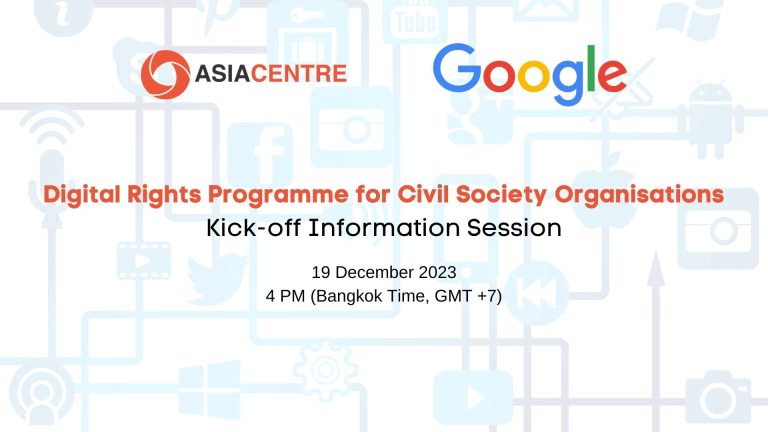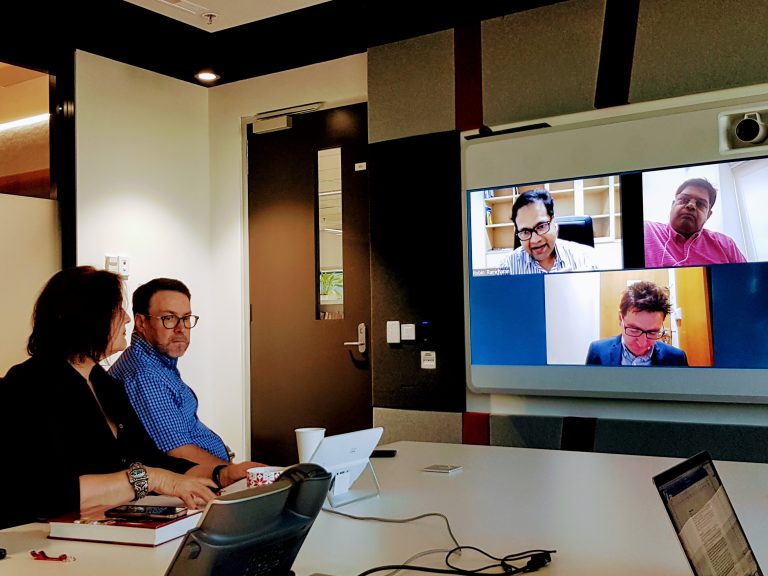
More than 30 representatives from civil society organisations (CSOs) and international non-governmental organisations (INGOs) attended the Kick-off Information Session of the Digital Rights Programme for Civil Society Organisations. Held online on 19 December 2023, participants represented 18 CSOs and 9 INGOs.
Co-convened by Asia Centre and Google, the programme aims, over a 12 month period, to strengthen the capacity of CSO to respond to legislation that impacts digital rights in the Asia-Pacific region. Since 2015, the region has been experiencing a rise in regulatory frameworks across national jurisdictions that restrict freedom of expression and impede freedom of assembly. This has led to the erosion of civic spaces and democracy within which CSOs operate.
The session started with a poll: What topic do you find most important to the work of your organisation? The four options were: Mis/Disinformation, Laws and Regulations, Digital Security, and Artificial Intelligence. Among the 24 people who took part, Laws and Regulation received 9 votes, Mis/Disinformation received 6 votes, Digital Security received 5 votes and AI received 4 votes.
Miriam Estrin, Google’s Global Lead on Content Regulation, welcomed the participants. She spoke of how, in a fast-evolving environment where digitalisation has become a significant facet of our lives, and that Google is pleased to support the activism work of CSOs through programmes such as these with Asia Centre.
Participants then introduced themselves, sharing their challenges and expectations for the programme. Their expectations ranged from wanting greater networking opportunities and learning how to mitigate digital security issues, to combatting disinformation online and offline, to knowing how to obtain the resources required to carry out their activities and programmes.
Dr James Gomez, Regional Director of Asia Centre, then gave an overview of the programme. He outlined the key challenges arising from increased digitalisation – fake news, curbed electoral integrity, fears of foreign interference, and perceived threats to social harmony, cultural values and national security. He pointed out that governments by enacting new laws or expanding the reach of existing ones, however, infringed on the rights of activists, CSOs and netizens across the region. He said urgent action is required to ensure that internet laws are used to promote online safety.

Hence, Dr. Gomez explained that the Asia Centre-Google programme have the following objectives:
- Identify regulatory frameworks and their impacts on civil society and human rights work.
- Collect and share knowledge of lived experiences of CSO activists, in order to create new strategies to respond to digital threats.
- Work with technology companies, INGOs and their local CSO partners to formulate actionable policy recommendations and to build capacity for CSOs to address the most urgent issues.
In terms of a breakdown, he explained further that the Digital Rights Programme for Civil Society Organisations is a year-long programme consisting of:
- 8 online topical meetings.
- a face-to-face regional meeting held in Bangkok, Thailand.
- a half-day country meeting each in Taipei, Taiwan, and in Phnom Penh, Cambodia.
- an end-of-programme meeting in Johor Bahru, Malaysia to plan and reflect on the next stage.
The kick-off session ended with an announcement of the next session, to be held on 18 January 2024, 5 PM – 6:30 PM (Bangkok Time, GM+7), when Asia Centre will launch its report: “Online Content Regulations in the Asia-Pacific”. This will be followed by a discussion with experts about the scope of the regulations in the region and their impact on CSOs. Please see here for more information regarding the online session.
To register for the session, click here.
Asia Centre is a civil society research institute in Special Consultative Status with the United Nations Economic and Social Council. It serves as a knowledge partner and undertakes evidence-based research as well as provides capacity-building training for end beneficiaries. If you would like to collaborate with the Centre, please send an expression of interest to contact@asiacentre.org.




